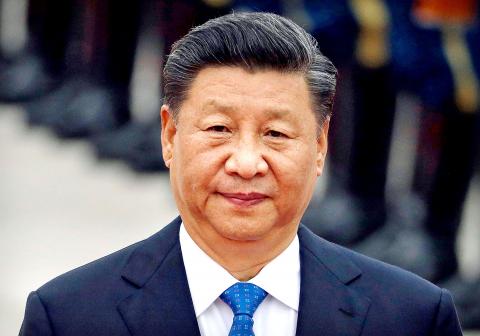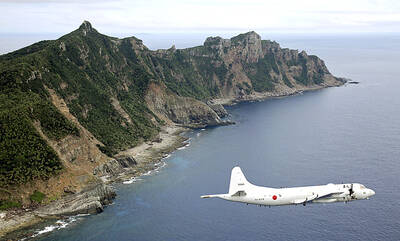Chinese President Xi Jinping (習近平) is poaching Taiwan’s diplomatic allies to divide Taiwanese before next year’s presidential and legislative elections and to solidify his position in the Chinese Communist Party (CCP) prior to a major party event, sources said yesterday.
Xi has targeted Taiwan’s diplomatic partners, in particular those in the South Pacific, trying to lure them away with checkbook diplomacy, sources familiar with national security issues said.
Xi has come under pressure ahead of China’s National Day and the CCP’s 19th Central Committee meeting next month, especially as the situation in Hong Kong needs to be stabilized and China’s economy is facing great challenges amid a trade dispute with the US, the sources said.

Photo: AFP
To ease mounting political pressure, Xi has ordered that attacks on Taiwan be increased, with his office drafting a plan to interfere in Taiwan’s elections, which is focused on luring away Taiwan’s diplomatic partners, banning Chinese tourists from visiting Taiwan and increasing military intimidation, the sources said.
Under the plan, China aims to to poach several of Taiwan’s allies in the South Pacific by Oct. 1 with an “unlimited budget,” ban all Chinese tour group travel to Taiwan by the end of this year and initiate a series of military moves along the median line in the Taiwan Strait, they said.
China is targeting Taiwan’s South Pacific allies because they are small countries that can be easily manipulated, the sources said.
A clear example is the Solomon Islands’ decision on Monday to switch diplomatic recognition to Beijing after China offered the nation a US$500 million package, they said.
Kiribati followed suit yesterday by announcing it was switching diplomatic allegiance to China.
Separately yesterday, the Mainland Affairs Council condemned Beijing for undermining Taiwanese foreign relations and attempting to force Taiwan to accept “one country, two systems.”
Despite stirring up unrest in the Indo-Pacific region with its rapacious expansionist policies and increased efforts to endanger Taiwan’s regional interests, Beijing cannot change the fact that the Republic of China (ROC) is a sovereign nation, it said.
Taiwanese will never accept any policies advocated by the People’s Republic of China (PRC), the council said.
Beijing must take responsibility, as it is the source of regional and cross-strait unrest, it added.
The council demanded that Beijing immediately cease its provocations and called on the international community to consider whether China’s actions should remain unpunished.
“This is a fight between democracy and authoritarianism,” it said.
The ROC is a sovereign country and Taiwan has never been a part of the PRC, the council said, adding that the government would take action to uphold the nation’s sovereignty and to protect the interests of its people.

MISINFORMATION: The generated content tends to adopt China’s official stance, such as ‘Taiwan is currently governed by the Chinese central government,’ the NSB said Five China-developed artificial intelligence (AI) language models exhibit cybersecurity risks and content biases, an inspection conducted by the National Security Bureau (NSB) showed. The five AI tools are: DeepSeek, Doubao (豆包), Yiyan (文心一言), Tongyi (通義千問) and Yuanbao (騰訊元寶), the bureau said, advising people to remain vigilant to protect personal data privacy and corporate business secrets. The NSB said it, in accordance with the National Intelligence Services Act (國家情報工作法), has reviewed international cybersecurity reports and intelligence, and coordinated with the Ministry of Justice Investigation Bureau and the National Police Agency’s Criminal Investigation Bureau to conduct an inspection of China-made AI language

LIMITS: While China increases military pressure on Taiwan and expands its use of cognitive warfare, it is unwilling to target tech supply chains, the report said US and Taiwan military officials have warned that the Chinese People’s Liberation Army (PLA) could implement a blockade within “a matter of hours” and need only “minimal conversion time” prior to an attack on Taiwan, a report released on Tuesday by the US Senate’s China Economic and Security Review Commission said. “While there is no indication that China is planning an imminent attack, the United States and its allies and partners can no longer assume that a Taiwan contingency is a distant possibility for which they would have ample time to prepare,” it said. The commission made the comments in its annual

‘TROUBLEMAKER’: Most countries believe that it is China — rather than Taiwan — that is undermining regional peace and stability with its coercive tactics, the president said China should restrain itself and refrain from being a troublemaker that sabotages peace and stability in the Indo-Pacific region, President William Lai (賴清德) said yesterday. Lai made the remarks after China Coast Guard vessels sailed into disputed waters off the Senkaku Islands — known as the Diaoyutai Islands (釣魚台) in Taiwan — following a remark Japanese Prime Minister Sanae Takaichi made regarding Taiwan. Takaichi during a parliamentary session on Nov. 7 said that a “Taiwan contingency” involving a Chinese naval blockade could qualify as a “survival-threatening situation” for Japan, and trigger Tokyo’s deployment of its military for defense. Asked about the escalating tensions

DISPUTE: A Chinese official prompted a formal protest from Tokyo by saying that ‘the dirty head that sticks itself out must be cut off,’ after Takaichi’s Taiwan remarks Four armed China Coast Guard vessels yesterday morning sailed through disputed waters controlled by Japan, amid a diplomatic spat following Japanese Prime Minister Sanae Takaichi’s comments on Taiwan. The four ships sailed around the Senkaku Islands — known as the Diaoyutai Islands (釣魚台) to Taiwan, and which Taiwan and China also claim — on Saturday before entering Japanese waters yesterday and left, the Japan Coast Guard said. The China Coast Guard said in a statement that it carried out a “rights enforcement patrol” through the waters and that it was a lawful operation. As of the end of last month,